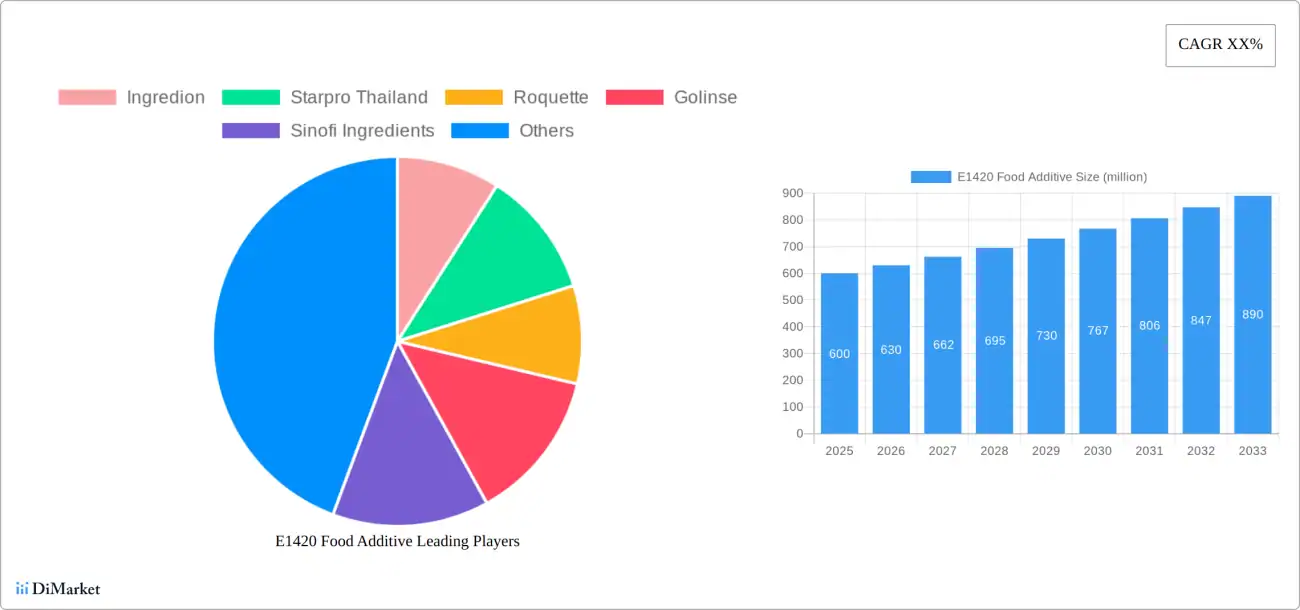What is E1420
E1420, also known as acetylated distarch phosphate, is a type of modified starch made from plant sources such as maize, potato, or tapioca. Through a controlled chemical process, the starch molecules are treated with acetic anhydride and phosphate, which changes their structure. These changes make the starch more stable when exposed to heat, acidity, or freezing, allowing it to perform better in various food applications.
In the food industry, E1420 is mainly used for its thickening, stabilising, and texture‑enhancing properties. It helps improve the consistency of a product, prevents separation of ingredients, and maintains a smooth mouthfeel, even after repeated heating or long storage. Because of its resistance to breakdown, it is especially helpful in products that need to withstand transportation or prolonged shelf life.
You’ll often find E1420 in:
- Processed sauces and gravies – to keep them smooth and prevent lumping
- Soups and broths – for a thicker, more uniform consistency
- Baked goods – to improve softness and moisture retention
- Dairy desserts – such as puddings and custards, for creamier texture
- Ready meals and frozen foods – to maintain texture after thawing and reheating
This additive plays a functional role rather than adding flavour, ensuring that foods look and feel appealing when they reach your plate.
Regulatory Status of E1420

E1420, also known as acetylated distarch phosphate, is regulated by several major food safety authorities. In the UK and across the EU, it’s approved by the European Food Safety Authority (EFSA) for use in a variety of food products, with strict limits on the maximum amount allowed. These limits depend on the type of food — for example, processed sauces and soups may have different permitted levels compared to bakery goods.
Internationally, the US Food and Drug Administration (FDA) considers E1420 generally recognised as safe (GRAS) when used within approved conditions, while the World Health Organization (WHO) and Joint FAO/WHO Expert Committee on Food Additives (JECFA) have also evaluated it and set an acceptable daily intake (ADI).
Its classification varies slightly worldwide — in the UK, EU, US, Australia, and New Zealand it’s allowed, but always within defined concentration limits. Some countries outside these regions may have stricter restrictions or not permit it at all, often due to differing national policies on modified starches rather than proven health risks.
Potential Side Effects of E1420
E1420, also known as acetylated distarch phosphate, is generally considered safe by major food safety bodies. However, as with most food additives, some people can experience side effects — usually only if they’re sensitive to modified starches or consume large amounts.
What studies say
Research in both humans and animals shows no evidence of toxicity at normal dietary levels. The additive mostly passes through the digestive system without being fully absorbed. That said, studies note that some individuals report mild digestive discomfort when consuming foods high in modified starch.
Possible allergic reactions
Allergic responses to E1420 are rare, but they can happen — particularly in people already allergic to natural starch sources (wheat, potato, maize, etc.). Symptoms can include skin rash, itching, or mild swelling.
Digestive issues in sensitive individuals
Some people, especially those with irritable bowel syndrome (IBS) or other gut sensitivities, may notice:
- Bloating
- Gas
- Loose stools or mild diarrhoea
This often happens when large servings of processed foods containing modified starch are eaten.
Impact on existing medical conditions
- Digestive disorders – can worsen existing bloating or discomfort.
- Coeliac disease – E1420 can be gluten-free if sourced from maize or potato starch, but it’s still important to check the label for wheat-based starch.
- Diabetes – E1420 doesn’t cause sharp spikes in blood sugar like regular starch, but it can still contribute to overall carbohydrate intake.
Effects on metabolism and blood sugar
E1420 is digested more slowly than some natural starches, so it may have a slightly reduced impact on blood sugar. However, this benefit is minimal and not a reason to consume more of it.
Who Should Be Cautious About Consuming E1420
E1420, also known as acetylated distarch phosphate, is generally considered safe for most people when eaten in small amounts. That said, some groups might want to be more careful with it in their diets:
- People with starch allergies or sensitivities – If you react to natural starches or modified starches, there’s a small chance E1420 could cause similar symptoms, such as bloating, discomfort, or mild skin reactions.
- Those with IBS or other digestive disorders – Modified starches can sometimes trigger issues like wind, cramps, or loose stools in people with sensitive guts. If you’ve got IBS, it may be worth keeping an eye on how you feel after eating products with E1420.
- Parents thinking about children’s diets – While it’s approved for use in the UK, some parents choose to limit additives in younger children’s meals, especially if they’re prone to tummy upsets.
- Low-carb or “clean eating” followers – E1420 is a processed carbohydrate. If you’re avoiding refined or modified carbs, you’ll find it in plenty of packaged foods, so you’ll need to read labels closely.
Natural vs Modified Starches What Makes E1420 Different
E1420, also called acetylated distarch phosphate, is a type of modified starch — basically, starch that’s been treated to change its structure. While natural starch (from potatoes, maize, tapioca, etc.) thickens foods naturally, it can break down under heat, freezing, or acidic conditions. Modified starch like E1420 is altered so it stays stable in those situations.
Here’s a quick comparison:
| Feature | Natural Starch | Modified Starch (E1420) |
|---|---|---|
| Source | Plant-based (corn, potato, tapioca) | Plant-based, then chemically treated |
| Heat resistance | Can break down with heat | Stays stable under heat |
| Freeze-thaw stability | Can separate when frozen | Maintains texture after freezing |
| Digestion | Digested the same way as carbs | Digested as carbs, but may be slightly slower in some cases |
| Main use | Thickening basic recipes | Used in processed foods needing long shelf life and consistent texture |
From a health point of view, both natural and modified starch are broken down into sugars in the body. For most people, there’s no big difference in digestion. However, natural starch is the less processed option, while E1420 is valued by food makers for its reliability in sauces, soups, ready meals, and frozen dishes.
Some people prefer to avoid modified starches if they want to stick to a “clean label” diet, but for manufacturers, E1420 solves common texture problems in foods that go through intense cooking or storage.
Tips for Consumers How to Avoid or Minimise E1420 Intake
If you want to cut back on E1420 (acetylated distarch phosphate), a few small changes make a big difference. Here’s what works best in the UK when shopping or cooking at home.
Read Food Labels
- Check the ingredients list for E1420 or names like acetylated distarch phosphate, modified starch, or acetylated starch.
- Watch for other E-numbers in the same category (such as E1400–E1451) if you’re avoiding modified starches altogether.
- Look closely at packaged and processed foods like soups, sauces, ready meals, baked goods, and dairy desserts – these often contain E1420.
Choose Clean Label Alternatives
- Go for products marked “No Artificial Additives”, “Clean Label”, or “Contains Only Natural Thickeners”.
- Opt for brands that list recognisable ingredients like cornflour, arrowroot, or tapioca instead of E-numbers.
Cook More at Home
- Making sauces, stews, and soups from scratch lets you control what goes in.
- Use natural thickeners such as:
- Cornflour
- Arrowroot powder
- Tapioca starch
- Potato starch
Pick Brands with Safer Ingredient Profiles
- Products from Taichy Food are formulated with a more transparent ingredient list, making them a better choice if you’re looking to avoid synthetic or overly processed thickeners.
Frequently Asked Questions
Does E1420 cause cancer or long term health problems?
There’s no solid evidence linking E1420 (acetylated distarch phosphate) to cancer or serious long-term health risks in humans. Food safety bodies like the EFSA and FDA have reviewed the data and found it safe when used within regulated levels. Most concerns tend to come from overconsumption of processed foods in general, not the additive alone.
Is E1420 safe for children and pregnant women?
For most healthy children and pregnant women, E1420 is considered safe in normal dietary amounts. That said, it’s still best to limit processed foods and aim for a balanced diet, especially during pregnancy. If there’s a history of food additive sensitivities, it may be worth avoiding it.
Can E1420 cause allergic reactions?
Reactions to E1420 are rare, but some people can have sensitivities to modified starches. Symptoms might include mild bloating, gas, or discomfort after eating foods containing it. If you notice these signs, cutting down or avoiding the additive can help.
How much E1420 is considered safe to consume daily?
There’s no specific set daily limit for E1420 because it’s generally considered low-risk at approved usage levels. The key is moderation — it’s fine if it’s part of an occasional meal, but regularly eating large amounts of processed foods that contain it isn’t recommended for overall health.


